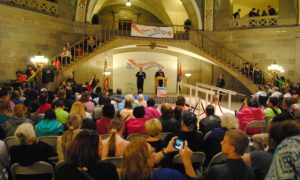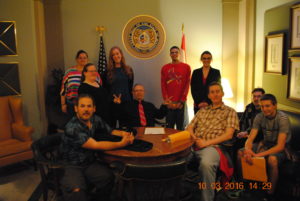
In March, several Columbians joined hundreds of other Missourians in the state capitol for the 15th annual Disability Rights Legislative Day. Among them were individuals supported by Boone County Family Resources, along with support staff and an intern.
The event is an opportunity for people with disabilities and advocates to exercise en masse their civil rights, and begins with a rally in the capitol rotunda, this year centered around the theme “Freedom to Choose My Own Path”.
It’s also an opportunity for participants to disperse after the rally and individually visit their legislators. “We visited our three state representatives,” says People First president Jason Mize. “They all supported what we talked about.”
This year as in past years, House Bill 1565 attempts to raise the asset limit for Medicaid eligibility, which has been frozen at $999.99 since its inception in the late 1960’s. People First, a self-advocacy organization and co-sponsor of the event, supports that legislation among other bills intended to enhance quality of life as well as dignity in life for people with disabilities.

“HB1565 passed in the House,” says Jason. “So I thanked our representatives for supporting it. Then we visited our senator’s office. He wasn’t there, but I left him some information about that bill and others People First supports.”
In meeting with legislators, constituents are able to express how particular legislation impacts their lives. The personal contact helps put faces on the legislative process for lawmakers, who also have a face-to-face opportunity to share their perspectives with constituents.
Constituents find that their legislators are human just like them, as they get a glimpse into the process of how a bill becomes a law — which can be complicated.
“I like getting to know my legislators,” says Jason. “I’ll run into Representative Rowden or Webber or Kendrick at a gas station and it’s like, ‘Hey I know you!’
Beyond visiting with lawmakers about specific pieces of legislation, recipients of support services funded in part by the state of Missouri are able to express their appreciation, and share about their lives.